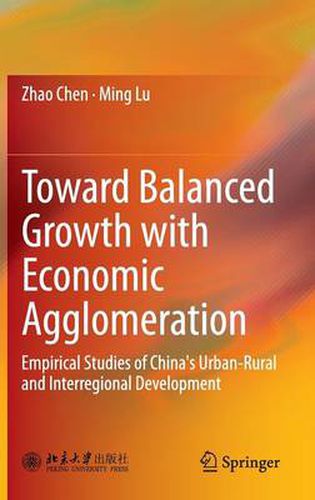Readings Newsletter
Become a Readings Member to make your shopping experience even easier.
Sign in or sign up for free!
You’re not far away from qualifying for FREE standard shipping within Australia
You’ve qualified for FREE standard shipping within Australia
The cart is loading…






This title is printed to order. This book may have been self-published. If so, we cannot guarantee the quality of the content. In the main most books will have gone through the editing process however some may not. We therefore suggest that you be aware of this before ordering this book. If in doubt check either the author or publisher’s details as we are unable to accept any returns unless they are faulty. Please contact us if you have any questions.
This book explains the relationships between equality and efficiency, as well as between government and market, in urban-rural and regional development by providing theoretical frameworks and empirical evidence. Urban-rural development in China is understood from a regional perspective, while the core issue of urban-rural and regional development is cross-regional resource reallocation driven by the trends of globalization, marketization and urbanization and their influence on growth and inequality. The book puts forward the following arguments: An urban-rural and regional balance should not be achieved by limiting agglomeration effects in eastern regions. For some time now, China has lacked a suitable mechanism to enable residents in underdeveloped and rural areas to share in the achievements of economic agglomeration. As a result, China should not slow down economic agglomeration and development in eastern regions simply by depending on administrative means to balance urban-rural and regional development. In the final analysis, arriving at a regional balance depends on growth in the eastern regions, provided a reasonable mechanism is implemented to enable inland areas to share in the development achievements of eastern regions. In turn, finding an urban-regional balance rests on urban development, as long as more rural workers can move to and prosper in cities.
$9.00 standard shipping within Australia
FREE standard shipping within Australia for orders over $100.00
Express & International shipping calculated at checkout
This title is printed to order. This book may have been self-published. If so, we cannot guarantee the quality of the content. In the main most books will have gone through the editing process however some may not. We therefore suggest that you be aware of this before ordering this book. If in doubt check either the author or publisher’s details as we are unable to accept any returns unless they are faulty. Please contact us if you have any questions.
This book explains the relationships between equality and efficiency, as well as between government and market, in urban-rural and regional development by providing theoretical frameworks and empirical evidence. Urban-rural development in China is understood from a regional perspective, while the core issue of urban-rural and regional development is cross-regional resource reallocation driven by the trends of globalization, marketization and urbanization and their influence on growth and inequality. The book puts forward the following arguments: An urban-rural and regional balance should not be achieved by limiting agglomeration effects in eastern regions. For some time now, China has lacked a suitable mechanism to enable residents in underdeveloped and rural areas to share in the achievements of economic agglomeration. As a result, China should not slow down economic agglomeration and development in eastern regions simply by depending on administrative means to balance urban-rural and regional development. In the final analysis, arriving at a regional balance depends on growth in the eastern regions, provided a reasonable mechanism is implemented to enable inland areas to share in the development achievements of eastern regions. In turn, finding an urban-regional balance rests on urban development, as long as more rural workers can move to and prosper in cities.